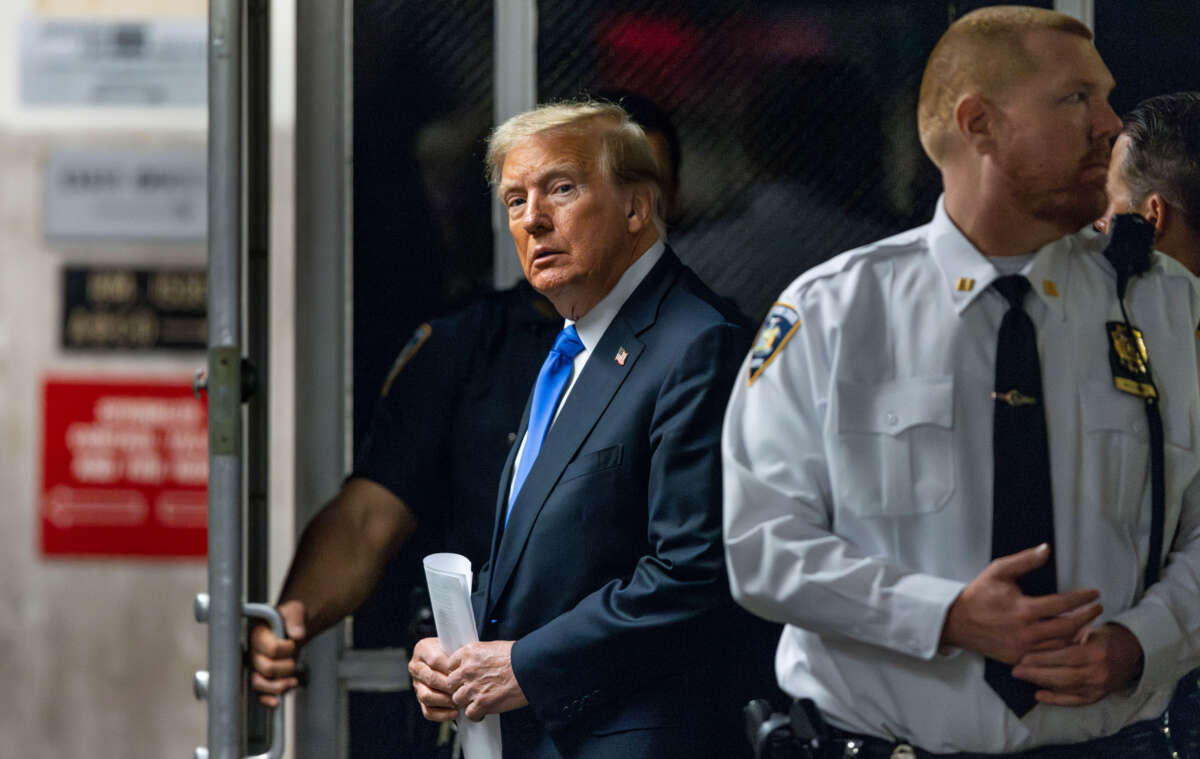Honest, paywall-free news is rare. Please support our boldly independent journalism with a donation of any size.
Immediately following a highly contested Supreme Court ruling that presidents and ex-presidents should be granted presumed immunity status for potentially illegal actions they took in office that were within the realm of their constitutional powers, former President Donald Trump’s legal team started the process to attempt to get his recent conviction in a New York state court overturned.
Trump’s lawyers sent a letter to the judge who oversaw his conviction, Justice Juan Merchan, requesting permission to file a motion that would throw out the outcome of the trial. The details of that letter are not yet public, but will be released when prosecutors submit a response.
According to sources speaking to ABC News with knowledge of the letter’s contents, Trump’s lawyers allege that some evidence presented at the trial should have been protected by the new presidential immunity standards.
Prosecutors on Tuesday stated that they would agree with the motion to delay the sentencing date. With both sides in agreement, it’s highly likely that Merchan will schedule a new date, and set up a time to discuss the merits of Trump’s lawyers’ claims of immunity. The sentencing date had been scheduled for July 11, just days before the Republican National Convention was set to commence, where Trump will formally accept his party’s nomination for president.
Trump was convicted in late May by a jury of his peers of 34 charges relating to hush money payments he made in the run-up to the 2016 presidential campaign to women he had extramarital affairs with. A popular tabloid magazine and Trump’s then-fixer lawyer Michael Cohen helped facilitate the payments, which Trump then reimbursed through funds derived from his eponymous business. Afterward, Trump falsified business records to conceal the reimbursements, which is illegal under state law.
Most of the actions involved in the case took place before Trump was president — however, some reimbursement payments made by Trump did happen while he was in the White House, a witness testified during the trial.
It’s possible that this is the evidence Trump’s lawyers believe should not have been included in the trial, due to presidential immunity that the U.S. Supreme Court has now said he can claim. However, it’s unclear how, exactly, the action of writing checks from a personal or business account fits into the standard that the Supreme Court created.
The High Court’s extraordinary ruling found that presidents should be given presumed immunity status for actions they take while in office that relate to their official duties. Critics lambasted the ruling as granting incredible protections to presidents, who can now engage in any number of illegal or improper actions without consequence, so long as they do so using the tools conferred to the executive branch of government.
But the ruling did limit the ability of presidents to make such privilege claims if their actions were not related to the office through use of presidential power.
“The President enjoys no immunity for his unofficial acts, and not everything the President does is official. The President is not above the law,” Chief Justice John Roberts said in the ruling.
Despite what appears to be clear limits on the extent of privilege Trump can claim (and how it relates to his New York trial), critics said that the Supreme Court’s ruling has the potential to do real harm to American democracy. The ruling will likely make it more difficult for prosecutors in other cases Trump is facing — including his election subversion case — to convict him, creating a higher judicial burden than previously existed.
“The Supreme Court just fundamentally altered the structure and nature of democracy in America. It awards the president the measure of power and immunity that is much, much closer to a king or emperor than an elected official,” Slate’s senior writer Mark Joseph Stern said.
“The President is immune from prosecution so long as he says he committed crimes as part of his ‘official’ duties,” said The Nation’s Elie Mystal. “So ends the part of the American experience where our leaders were bound by the rule of law.”
In her dissent to the majority’s opinion, Justice Sonia Sotomayor issued a dire warning about the new standard.
“Whether described as presumptive or absolute, under the majority’s rule, a President’s use of any official power for any purpose, even the most corrupt, is immune from prosecution. That is just as bad as it sounds, and it is baseless,” Sotomayor wrote, adding:
If the occupant of that office misuses official power for personal gain, the criminal law that the rest of us must abide will not provide a backstop. With fear for our democracy, I dissent.
Press freedom is under attack
As Trump cracks down on political speech, independent media is increasingly necessary.
Truthout produces reporting you won’t see in the mainstream: journalism from the frontlines of global conflict, interviews with grassroots movement leaders, high-quality legal analysis and more.
Our work is possible thanks to reader support. Help Truthout catalyze change and social justice — make a tax-deductible monthly or one-time donation today.
